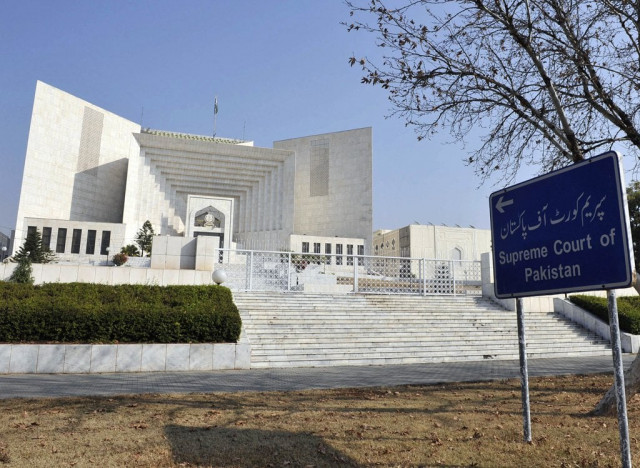SC verdict stands in way of presidential system
Court in 2015 said parliamentary system was amendable, salient feature of Constitution

Supreme Court. PHOTO: AFP/FILE
In 2015, the majority of Supreme Court judges, in the 21st Constitutional Amendment case, had held that the parliamentary form of government is one of the salient features of the Constitution which cannot be amended through a constitutional amendment.
Justice Sheikh Azmat Saeed had authored the verdict which had been endorsed by eight judges.
The verdict said the Constitution contains a scheme reflecting its salient features which define the Constitution and such salient features are obvious and self-evident upon a harmonious and holistic interpretation of the Constitution.
Lawyers, politicians unite against anti-democratic moves
“In an effort to discover such salient features material outside the Constitution cannot be safely relied upon. The salient features are ascertainable from the Constitution including democracy, the parliamentary form of government and independence of the judiciary,” said the ruling.
It further said the powers of the parliament to amend the Constitution are subject to implied limitations and the parliament, in view of Articles 238 and 239, is vested with the power to amend the Constitution as long as the salient features of the Constitution are not repealed, abrogated or substantively altered.
The verdict also noted that the apex court is vested with the jurisdiction to interpret the Constitution in order to ascertain and identify its defining salient features. It is equally vested with jurisdiction to examine the vires of any constitutional amendment so as to determine whether any of the salient features of the Constitution have been repealed, abrogated or substantively altered.
Some legal experts believe that the verdict will be a hurdle in the way of those who are considering introducing presidential system in the country. However, one section of lawyers believes that the court’s verdict is a conflicting one.
“It says democracy is a salient feature of the Constitution but also declares that the parliamentary system is also a salient feature of the Constitution. In a democracy, the people have the option to choose what kind of system they want to adopt for governance,” said a legal expert.
However, Barrister Ayesha Siddique Khan said the presidential system ensures separation of powers but at the cost of compromising on democracy and the executive’s accountability to the parliament.
“The solution is not to introduce a presidential system but to strengthen the parliamentary democracy through local bodies, transparent electoral process and greater political participation,” she added.
The Pakistan Bar Council and major political parties especially the Pakistan People’s Party (PPP) on Friday reiterated their stance to resist any move to impose a presidential system.



















COMMENTS
Comments are moderated and generally will be posted if they are on-topic and not abusive.
For more information, please see our Comments FAQ